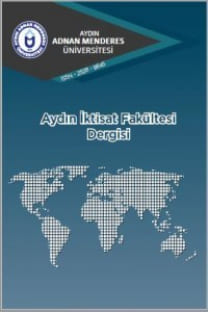TÜRKİYE İÇİN KARBON EMİSYONLARININ TAHMİNİ: ZAMAN SERİSİ ANALİZİ
Sürdürülebilir kalkınma hedefi bağlamında küresel ısınmaya yol açan sera gazlarının (GHG) azaltılması
ve özellikle gelişmiş ülkelerin önlem alması, ilk kez 1992 Rio konferansında görüşülmüştür. Daha sonra
bu görüşmeleri, gelişmiş ülkelere ulusal GHG azaltım hedefinin verildiği Kyoto Protokolü takip etmiştir.
Kyoto Protokolü'nde gelişmiş ülkelere 2008-2012 döneminde 1990 yılına göre GHG'nı %5 azaltması
hedefi verilmiştir. Türkiye, Kyoto Protokolü'nü 2009 yılında özel şartları dikkate alınarak imzalamış ve
yükümlülük almamıştır.2012 sonrası GHG azaltım yükümlülükleri Birleşmiş Milletler İklim Değişikliği
Çerçeve Sözleşmesi (UNFCCC) kontrolünde hala yürütülmekte ve gelişmiş ülkelerin yanı sıra
gelişmekte olan ülkelerin de GHG azaltım yükümlülüğü alması beklenmektedir. Bu bağlamda gelecek
GHG emisyonlarını tahmin etmek Türkiye için önemlidir. 2020 yılı için çeşitli GHG emisyonu
tahminleri vardır ve bu sonuçlar farklı emisyon seviyelerine işaret etmektedir. Bu çalışmada; Türkiye
için 2020 yılı ve sonrası için GHG emisyon seviyesini zaman serisi ve regresyon analizi ile tahmin
edilmiştir. Ayrıca Türkiye'de, GHG emisyonları azaltımı için öneriler sunulmuştur.
Anahtar Kelimeler:
Karbon Emisyonları, Zaman Serisi Analizi, İklim Değişikliği Politikası Emisyon Projeksiyonları
CARBON EMISSIONS FORECAST FOR TURKEY: TIME SERIES ANALYSIS
Within the context of sustainable development objectives, reducing greenhouse gas emissions (GHG) that cause clirnate change
was first discussed and officially negotiated at the 1992 Rio Conference, which particularly ernphasised developed countries to take
serious measures. Then, it was followed by the Kyoto Protocol, which specified national ghg ernission reduction targets for
developed countries. With Kyoto Protocol, it was decided for these countries to reduce global ernissions by %5 below 1990 levels
compared to 2008-2012 emission levels. Turkey becarne a party to the Kyoto Protocol in 2009, yet due to their special circumstances
they did not take any emission reduction cornmitrnents .. Negotiations on Post-2012 emission reduction obligations are stili in
progress under the UNFCCC urnbrella and it is expected to have ernissiorı reduction targets not only by developed countries but
also by developing ones. In this regard, it is irnportant for Turkey to estirnate its future ghg emissions. There are various ghg
ernission estirnations for 2020 and the results indicate different ernission levels. Objective of this study is to estirnate ghg ernission
levels far Turkey far 2020 and afterwards by using time series and regression analysis. Then, appropriote policy implications are
discussed with the result of these findings.
- ISSN: 2528-9845
- Yayın Aralığı: Yılda 2 Sayı
- Başlangıç: 2016
- Yayıncı: Adnan Menderes Üniversitesi
Sayıdaki Diğer Makaleler
KADININ POLİTİKADA TEMSİLİ, POLİTİK DUYARLILIK VE ÇOCUK SAĞLIĞI GÖSTERGELERİ
İtalyan ve Türk İşçilerin Göç Tarihi Işığında İşçi Dövizleri ile Maliye Politikası Arasındaki İlişki
TÜRKİYE İÇİN KARBON EMİSYONLARININ TAHMİNİ: ZAMAN SERİSİ ANALİZİ
Yılın Ayı Etkisi: Ellibeş Adet Borsada GARCH Modellerinden Bulgular
Phillips Eğrisi Teorisi Türkiye’de Geçerli mi? Yapısal Kırılmalı Bir Ekonometrik Analiz
